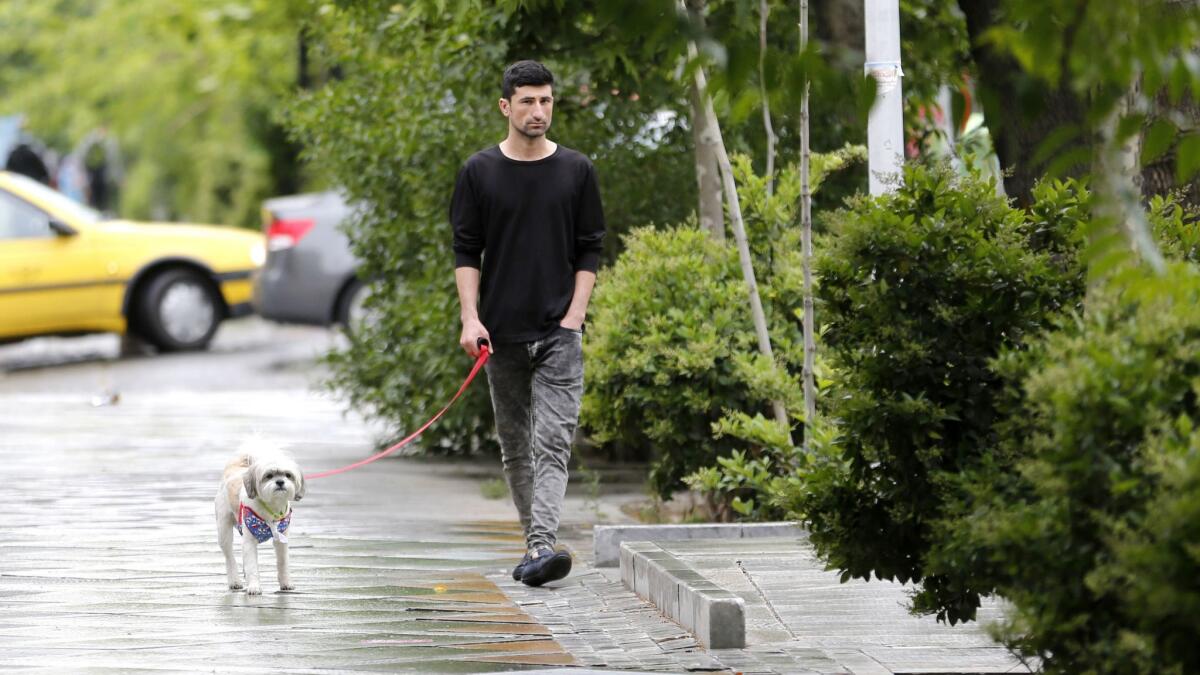Walking your dog is banned in Tehran, but that’s not stopping dedicated pet owners

Reporting from Tehran — Hands in his pockets on a cool, windy Tehran night, Behnam Hedayat was engaged in a seemingly benign activity, something tens of millions of people do every day: walking a dog.
In this case it was his terrier Shika, who he says is “as dear as my child.”
But under a ban announced this week by hard-line authorities, walking a dog in public or transporting it by car could put the authorities on Hedayat’s tail.
“The police have many other things to deal with like muggers, burglars and car robbers,” he said. “If the police hassle my dog, I will resist and fight for my dog with the police.”
Despite their rising popularity among Iranians, the pet seen in the West as man’s best friend is perceived by religious hard-liners here as an example of corrupt Western culture.
Owning a dog should be forbidden, they say, because Islamic teachings say that dogs are “najes” or “untouchable” because they are dirty.
In announcing the public prohibition, Tehran Police Chief Hossein Rahimi claimed Tuesday that dogs cause fear and anxiety in public spaces.
“Police have received permission from the judiciary branch to crack down on people walking dogs in Tehran,” Rahimi told the Young Journalists Club news site, a mouthpiece for Iran’s political establishment. “Carrying dogs in cars is also banned and if a dog is seen inside the car, police will confront the owner of the dog.”
Nezakat Alouloj was walking her small terrier in a park west of Tehran shortly after learning of the ban and was among those who reacted with fury about the possibility of becoming an outlaw for escorting a pooch in public.
“He is toilet trained and is my soulmate,” Alouloj said of her tiny companion.
The 60-year-old former Turkish-language radio host predicted that authorities won’t succeed in enforcing a ban because dog ownership is becoming increasingly popular in the capital of the Islamic Republic.
“More pet dogs are being adopted by families,” she said. “Authorities will soon forget the ban.”
Homa Arderoudi, 65, owns a German shepherd named Sita. She also criticized the announcement and said that authorities should be adapting themselves to the changing tastes and lifestyles of Iranians.
Arderoudi plans to ignore authorities because her dog is more than a pet. It’s her one and only companion.
“I have two grown-up sons, one in asylum in Sweden and one seeking asylum and now based in Istanbul. I have nobody except my dog,” she said. “The government has lot of more important problems to deal with.”
Several weeks before the ban was announced, Shafagh Divanpour gripped the leash of three dogs — Charlie, Rouko and Bonti — as they bolted ahead.
The two cocker spaniels and cavalier mix were a surprising sight for people who caught a glimpse of them walking in the park.
Stunned pedestrians stopped Divanpour to ask him what he was doing with three dogs. The 33-year-old took advantage of his newfound popularity to encourage onlookers to pet the pooches.
“Please be responsible parents,” he told them. “If you cannot afford to be long-term friends with your dog, don’t adopt. Dogs are sensitive and faithful, and if you abandon them they suffer.”
Financially strapped and unemployed, Divanpour is one of a growing number of young professionals turning toward a new industry in Tehran that’s raising eyebrows: dog walking.
Dogs, Deepak Chopra, Instagram weddings and other signs of change among Iran’s middle class »
For Tehran’s professional dog walkers, the gig represents both a passion and a source of income.
The unemployment rate among university graduates in Iran is more than 35%, according to Iran’s Labor and Welfare Ministry. But Divanpour said that on the days he works 12 hours, he earns nearly $100.
Still, fears of a crackdown already are affecting dog walkers such as Divanpour. Some dog owners, worried about police seizing their beloved canines, are canceling service.
“My dog walking assignment has been reduced to half since the announcement was made,” Divanpour said Wednesday.
Divanpour became a dog walker after he saw an ad on Petchi, a website dedicated to connecting dog owners with trained dog walkers.
Dog ownership has been a contentious topic in the decades after Iran’s 1979 Islamic Revolution. Since then, Iranian authorities have confiscated dogs and lawmakers have threatened to punish with 74 lashes those owners who walk their dog in public.
Yet to the dismay of conservatives, Iranians from the middle and upper class have been increasingly embracing dogs as loyal companions in recent years. For instance, in 2017, animal activists called for legislation to punish animal cruelty.
According to Petchi, there are around 1.2 million pet dogs across Iran and about 350,000 of them are in Tehran.
Divanpour remains hopeful that the cultural shift toward owning a dog will prevail.
“I believe this issue will be forgotten,” he said. “Dog owners must be brave and assert their own rights and their animals’ rights.”
Times staff writer Etehad reported from Los Angeles and special correspondent Mostaghim from Tehran.
More to Read
Sign up for Essential California
The most important California stories and recommendations in your inbox every morning.
You may occasionally receive promotional content from the Los Angeles Times.











